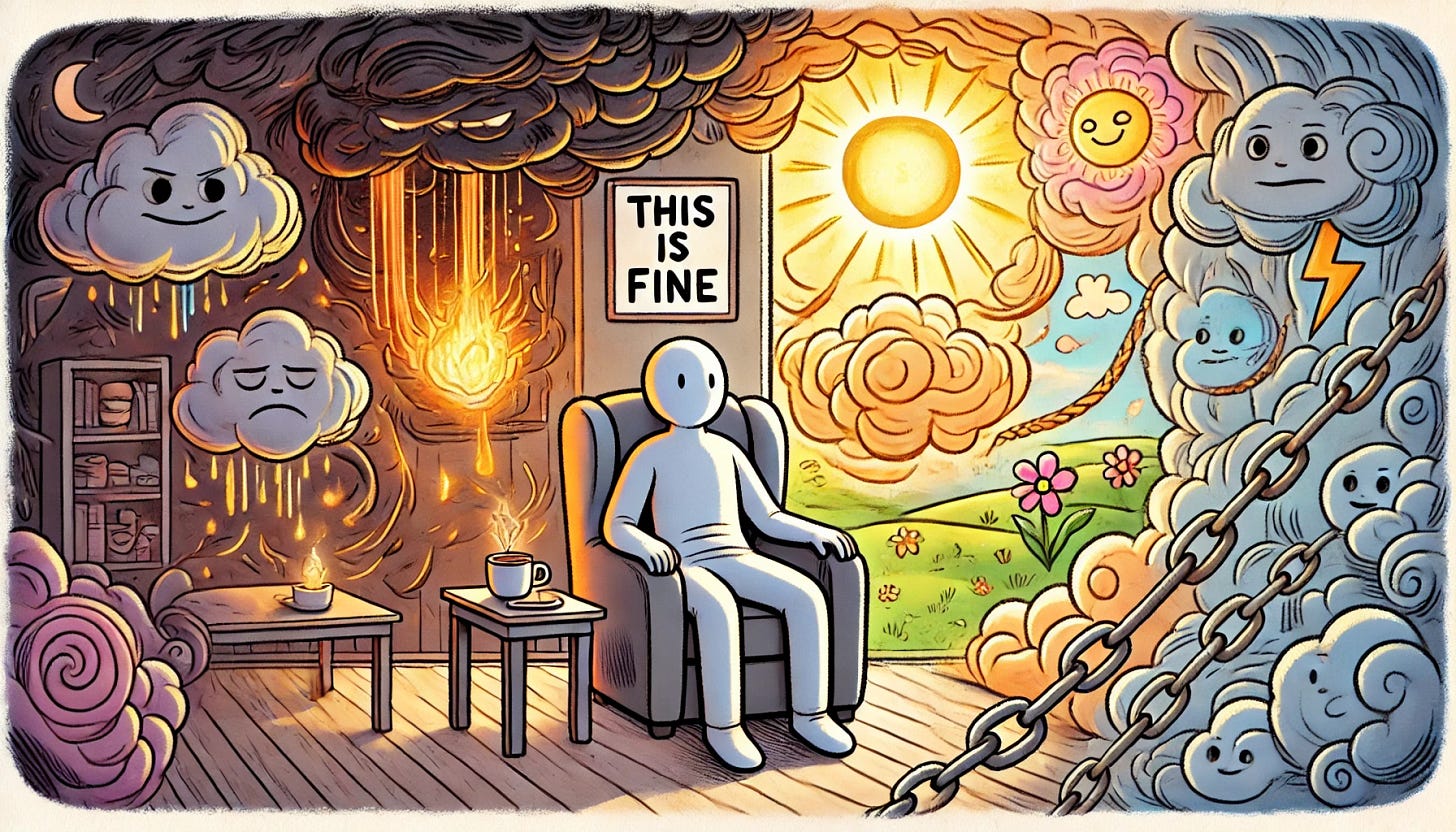Greetings, friend.
Imagine strolling through a garden of roses, intoxicated by their beauty and fragrance. But as you walk, you stub your toe on a hidden stone. Instead of acknowledging the pain, you smile forcefully and say, “Wow—would you look at those roses!”
This is the paradox of toxic positivity—a refusal to admit the existence of the stone and the very real bruise it leaves behind. Which is why it’s so often linked to spiritual bypassing.
Let’s sit with this for a moment. What does it mean to bypass? To sidestep. To gloss over. To ignore the gritty, messy truths of life. And yes, I’ve seen this in myself and others:
Avoiding the traumas that hum quietly beneath our actions, shaping us in ways we don’t see.
The self-righteous glow of a “holier-than-thou” mindset that isolates us in our perceived enlightenment.
The suppression of raw emotions—grief, anger—that clamour to be heard but are shushed away.
And, of course…
The forced, syrupy optimism that pretends to harmonize but instead creates dissonance within us.
You’ve met someone like that, haven’t you? Maybe you’ve caught glimpses of it in yourself, too. I know I have.
The Power of Thoughts and Words
Here’s the thing: our thoughts and words do hold immense power over our well-being. Positive thoughts feel like a hug from your grandma—warm and inviting, opening up space within, allowing us to breathe deeply and fully. Negative thoughts, by contrast, are constricting and heavy, tightening our bodies like an angry, clenched fist.
Both types of thoughts leave their impressions on us. Positive ones nurture, enhancing our vagal tone and lowering stress hormones like cortisol. Negative ones, on the other hand, can constrict and burden the body, setting off a torrent of tension and imbalances. These impressions are deeply biological, affecting us even at the cellular level.
The positivity I’m referring to isn’t about ignoring pain or pretending darkness doesn’t exist. It’s not the kind of 'positive thinking' that replaces discomfort with fluff, bypassing the truth of what we feel.
But there’s an important distinction to make here, between positive thoughts that are genuinely kind and enriching to our well-being, and glittery, superficial ones that are harmful to it.
The positivity I’m referring to isn’t about ignoring pain or pretending darkness doesn’t exist. It’s not the kind of 'positive thinking' that replaces discomfort with fluff, bypassing the truth of what we feel.
Spiritual bypassing, by definition, is the act of ignoring or denying what is. It’s a refusal to digest the present reality within and around us. And when positivity becomes a tool to dismiss that reality—when it glosses over anger, grief, or fear—it shifts from being a source of healing to a source of harm.
The difference is subtle but crucial. True positivity sits beside the truth, offering comfort without erasing it. Spiritual bypassing pretends the truth isn’t there at all, leaving us stranded in denial.
The Cave of Vulnerability
Here’s another truth: vulnerability is the cave we fear to enter, dark and intimidating. Yet, it’s in that darkness that we find the jewels of healing and growth. To bypass our vulnerability is to remain outside the cave, longing for the treasure but unwilling to face the shadows.
‘Positive’ thinking that denies us the right to feel our vulnerability robs us of peace. It also robs us of the opportunity to take proper action.
Real positivity isn’t about spinning fluffy tales or drowning reality in glitter. It’s a steadying hand on the shoulder—a truth-teller wrapped in kindness. It’s rooted in the here and now, grounded in the integrity of what is.
Living with chronic illness has taught me this lesson over and over. How do you tell yourself the truth about uncertainty? How do you sit with it without crumbling?
From Fluff to Real Stuff
For example, it’s not about telling yourself you’ll never lose your job or that no financial complications will ever strike you. Instead, it’s about affirming that you’ll have the strength and support to carry on if such an event occurs.
Similarly, it’s not about believing you’ll never fall terminally ill. It’s about assuring yourself that should such a fate occur, you’ll love yourself unconditionally and hold on to grace through it all.
Living with chronic illness has taught me this lesson over and over. How do you tell yourself the truth about uncertainty? How do you sit with it without crumbling? I’ve learned that embracing the raw truth—letting it soften me instead of stiffen me—is the key to peace.
The Truth Sets Us Free
Positivity becomes toxic when it paralyzes us into a state of inertia, unable to take the required actions to make necessary changes. It’s not about escaping into an imaginary world of fluffy, baseless mantras whenever life gets rough.
It’s about the loving words we tell ourselves that guide us through challenges while keeping our eyes open to the truth. And nothing—no mantra, no forced smile—compares to the freedom that comes from meeting life as it truly is.








💯